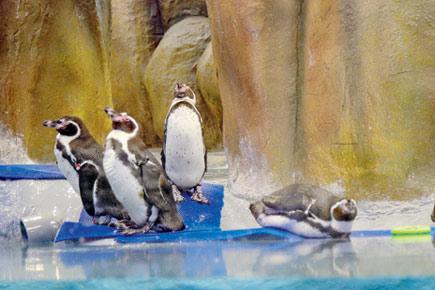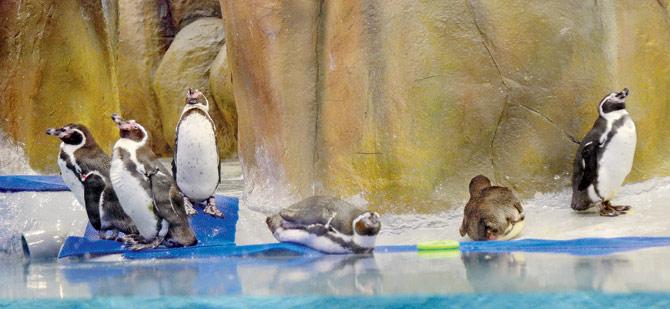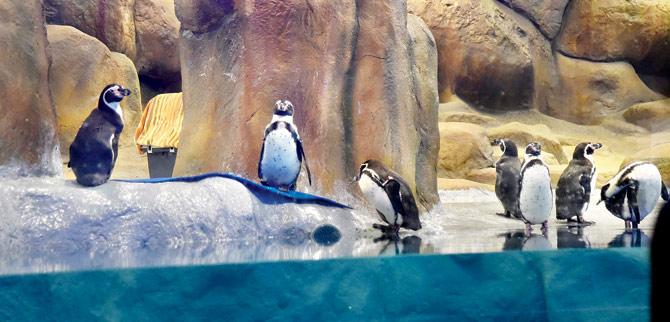mid-day snaps Byculla zoo's latest lovers, deep in courtship and preparing for the big commitment leap

 (Left) Donald and (second from lelt) Daisy, Olive (second from right) and Popeye (extreme right) showed signs of mating
(Left) Donald and (second from lelt) Daisy, Olive (second from right) and Popeye (extreme right) showed signs of mating
ADVERTISEMENT
If people made up their mind as quickly as penguins, we wouldn't need relationship counselors. A visit by this writer and photographer to the Humboldt penguin enclosure at Byculla zoo yielded an experience that would melt the heart of the harshest critic who opposed the arrival of these exotic creatures into sultry Mumbai.
Donald and Daisy, two of the seven penguins who are currently the city zoo's most visited inhabitants, were inseparable. As you can see from this picture, they stood side by side, following each other while the rest splashed about in the pool or pottered around the enclosure. The courtship comes just in time for the mating season.
Sticks and stones are for breaking bones, but not if you are Donald and Daisy. Penguins, known to be fairly romantic creatures, who take care of their partners, build love nests out of pebbles and twigs. It's here that they raise their children. In fact, according to some estimates, over 70 per cent of penguins return to mate with the same partner, and this behaviour is associated with 'nest site fidelity'.
 A cage has been installed inside the exhibit to facilitate penguin breeding
A cage has been installed inside the exhibit to facilitate penguin breeding
Experts at the zoo have a plan in place to help build the mood, adding pebbles to the enclosure before mating kicks off. “We have spread pebbles and twigs throughout the habitat to help them make their nest,” said Sanjay Tripathi, zoo director. The other prerequisite for love to blossom is privacy. But with hundreds of visitors lining up every day for a glimpse of the birds, catching some alone time looks tricky. The caretakers have constructed a coop within the enclosure to allow them to canoodle away from prying eyes. “A hutch has been formed behind the enclosure for privacy. Visitors won't be able to see it,” Tripathi added. “Both, the male and female partners take care of the egg in intervals. We have introduced sand and pebbles in the enclosure to make the surroundings safer for the chicks. The incubation period for an egg is between 40 to 42 days,” says Dr Madhumita Kale, veterinarian in charge.
Zoo authorities realised that the pairing was unfolding when they saw the couples vocalise with each other, a sign of impending mating. To strengthen their bond, penguins preen or clean each other's feathers. “For the past few days, they have been preening and vocalising with their partners which shows they are ready,” says Dr Kale.
Of the remaining five, caretakers say, another pair, Olive and Popeye are also showing signs of saying ILU, ILU. They are three years old while the other two, Bubble and Mr Molt are one-year-old.
Last October, the seventh penguin, Dory died of bacterial infection that caused septicaemia, leading to animal activists critiquing the civic body for the initiative. Flipper, the sole female penguin who doesn't have a partner to pair off with, will have to wait for permission from the Central Zoo Authority if a male partner must be acquired for her.
After 15 years, the Byculla Zoo brought in a new animal after the Bombay High Court had prohibited purchase of new animals in 2005 due to poor infrastructure. The species was chosen because it can survive in relatively higher temperatures. They are medium-sized penguins (adults are 56-70 cm tall) and have a life span of up to 20 years.
 Subscribe today by clicking the link and stay updated with the latest news!" Click here!
Subscribe today by clicking the link and stay updated with the latest news!" Click here!






